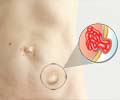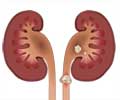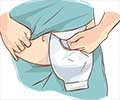- After 2-3 days, it is not necessary to keep your incisions covered but it will usually make you more comfortable to do so as you increase your activity.
- If you do not see metal clips or sutures, the sutures are in the skin itself and will dissolve. This occurs 3-4 weeks after surgery and may be associated with a little drainage from the incision.
- It is common for patients to notice some black and blue or maroon discoloration around the incision. This represents a small amount of blood and is normal. It should not alarm you. It is also common for this to only become apparent 2-3 days after surgery as blood in the tissues moves to the surface.
- Contact the doctor if your incision is red, hot and tender; you may have an infection.
- You have been given antibiotics in the operating room prior to surgery. Unless discussed with you, you do not need them after surgery.
- You may also notice black and blue discoloration near your incision. This is not cause for alarm, even if it occurs a few days after the surgery. It will usually resolve in 7 to 10 days.
- It is normal for the incisions and the hernia site to be hard and swollen following surgery. This is called a healing ridge and represents wound healing. It is not a hernia and will go away in eight to twelve weeks.
- Do not tan your incision for one year after surgery, as it will darken your scar.
- Some people believe Vitamin A and Vitamin E applied to the incision helps wound healing.
Bowel habits
- Following your surgery you may notice alterations in your bowel habits.
- Diarrhea can occur from the surgery itself or from the antibiotics you received.
- Constipation is very common and results from the narcotic pain medicine you are taking.
- If you or your family were not informed of anything unusual after surgery, rest assured that everything is fine and went according to plan.
Contact your doctor if you experience:
- Significant bleeding
- Difficulty breathing
- Persistent light headedness
- Chills and/or fever greater than 101°F
- Pus or infection at the incisions
- Inability to pass urine
- Severe pain
- Any worrisome condition















i am 54 years lady at present i have an incisional Hernia, 4 years back i had undergone operation uterus removing whether immediate surgery is required but i don't have any pain